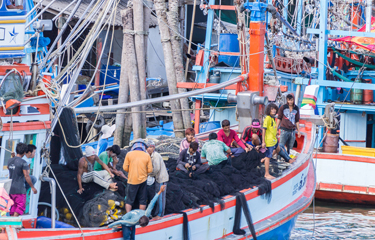Thailand Deputy Prime Minister General Prawit Wongsuwan has confirmed his country will continue to reform its seafood industry, despite mounting pressure from domestic fishing groups.
Wongsuwan made the statement in an 18 October meeting with Environmental Justice Foundation Executive Director Steve Trent, according to EJF.
Thailand has implemented substantial reforms, designed to eradicate illegal fishing and address human rights abuse at sea. However, in recent months the National Fishing Association of Thailand has been lobbying the government to roll back many of these progressive measures. This show of renewed political will to protect and strengthen the reforms is a welcome sign, EJF said in a release.
EJF has for the past five years worked closely with the Royal Thai government to eradicate the illegal fishing and human rights abuse that has plagued its fishing industry, EJF said, adding that the country has made significant progress in doing so.
The kingdom in 2018 became the first country in Asia to ratify the International Labour Organization’s P29 convention, which promises protection to the victims of forced labor and sanctions for the perpetrators, and this year ratified the ILO’s Work in Fishing Convention (C188), which sets basic standards of work in the fishing industry. This progress has been recognized by the European Union, and the country’s yellow card trade warning over illegal fishing was lifted earlier this year.
EJF said Thailand’s monitoring, surveillance, and enforcement capabilities have also shown good progress, and a move towards transparency, including making license lists public, have been important steps.
In recent months, however, demands by the National Fisheries Association of Thailand (NFAT) that the government rollback on reforms have ignited concerns.
In a closed-door meeting, NFAT demanded that all restrictions on the crew and catch transfers at sea be lifted. This would allow abusive vessel owners to swap enslaved migrants between vessels so that they almost never made landfall, with virtually no chance of escape or detection by the authorities. Numerous such cases were documented in Thai fisheries before the current reforms were implemented.
It would also allow operators to launder illegally caught fish between boats, rendering it untraceable and helping it make its way into international supply chains undetected.
Afterwards, 35 organizations, including EJF, Sainsbury’s, Morrisons, Lyons Seafoods, Greenpeace, and Oxfam, signed and presented a letter to Thailand’s prime minister condemning the demands and urging the government to protect reforms.
Despite the domestic pressures, the Thai government continues to take a firm stance on driving the reforms forward, EJF said.
“Thailand acknowledges the importance of continuing with the reforms and the government will persevere with that to secure marine sustainability and lead the country to become an IUU [illegal, unreported and unregulated fishing] free nation,” Deputy prime minister Wongsuwan said at the meeting.
The reforms brought in by the Royal Thai government have had a clear, important, positive impact on Thailand’s fisheries and have been crucial to improvement in the country’s economy, fish stocks, and international reputation, according to Trent.
“It is very reassuring to hear that the government is committed to entrenching these reforms to prevent Thailand’s fisheries returning to their dark past," Trent said.
EJF said it remains committed to working with the government and all other stakeholders across the fishing and seafood sectors to deliver a sustainable, legal and ethical industry.
In a separate move, Darian McBain, the global director of corporate affairs and sustainability at Thai seafood giant Thai Union, has received the 2019 Freedom Award at the Anti-Slavery Australia Freedom Awards. The honor was given for her "outstanding contribution in combating modern slavery," Thai Union said Monday, October 21.
Confronted with significant challenges around human rights violations and trafficking throughout the Thai fishing industry, Thai Union has turned around its operations under McBain's leadership. Shortly after joining Thai Union in 2015, McBain implemented sweeping reforms to Thai Union’s operations, including creating the SeaChange sustainability strategy - a comprehensive set of commitments and actions to ensure the company operates sustainably, and constantly improves to help change the seafood industry for good, according to Thai Union.
Photo courtesy of Bumbim Pensinee/Shutterstock







